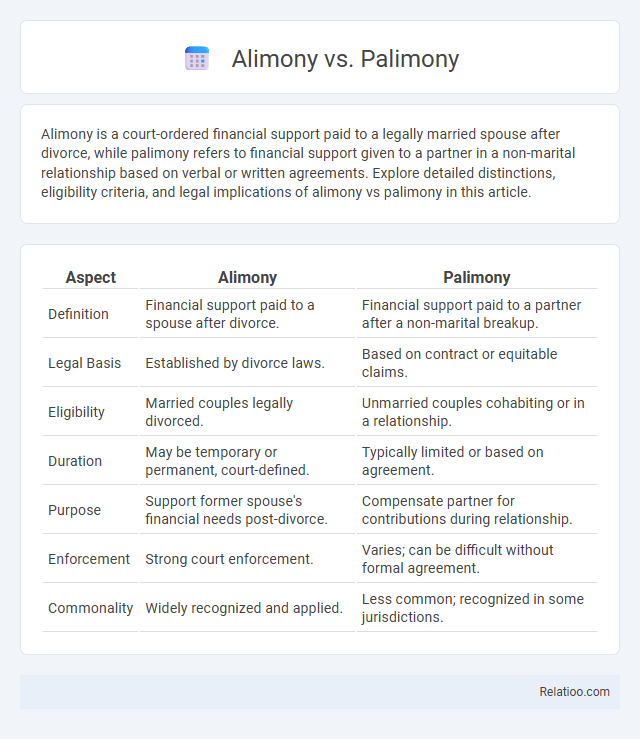Alimony is a court-ordered financial support paid to a legally married spouse after divorce, while palimony refers to financial support given to a partner in a non-marital relationship based on verbal or written agreements. Explore detailed distinctions, eligibility criteria, and legal implications of alimony vs palimony in this article.
Table of Comparison
| Aspect | Alimony | Palimony |
|---|---|---|
| Definition | Financial support paid to a spouse after divorce. | Financial support paid to a partner after a non-marital breakup. |
| Legal Basis | Established by divorce laws. | Based on contract or equitable claims. |
| Eligibility | Married couples legally divorced. | Unmarried couples cohabiting or in a relationship. |
| Duration | May be temporary or permanent, court-defined. | Typically limited or based on agreement. |
| Purpose | Support former spouse's financial needs post-divorce. | Compensate partner for contributions during relationship. |
| Enforcement | Strong court enforcement. | Varies; can be difficult without formal agreement. |
| Commonality | Widely recognized and applied. | Less common; recognized in some jurisdictions. |
Understanding Alimony: Definition and Purpose
Alimony is a court-ordered financial support that one spouse must pay to the other after separation or divorce, intended to provide economic stability and ensure a comparable standard of living. Palimony, unlike alimony, pertains to financial support granted to a partner in a non-marital relationship based on contractual agreements or equitable grounds. Understanding alimony helps you recognize its purpose of addressing financial disparities post-divorce and securing fair economic support based on income, duration of marriage, and individual needs.
What is Palimony? Breaking Down the Concept
Palimony refers to financial support paid to a partner in a non-marital cohabitation relationship, distinguishing it from alimony which is awarded after divorce. Unlike alimony, palimony is not guaranteed by law and typically requires a written or implied contract proving the couple intended to share assets or provide support. The concept of palimony gained prominence after the landmark 1976 California case Marvin v. Marvin, establishing legal grounds for support outside traditional marriage.
Legal Differences Between Alimony and Palimony
Alimony refers to court-ordered financial support paid by one spouse to another after divorce, governed by formal marriage laws, whereas palimony involves support agreements between unmarried partners, typically based on contract or equitable principles. Alimony is enforceable through family law statutes, while palimony claims rely on state-specific interpretations of cohabitation and partnership rights without marriage certificates. Legal differences include eligibility criteria, duration, and evidentiary requirements, with alimony often awarded for longer periods and palimony contingent on proving an implied or explicit support agreement.
Eligibility Criteria for Alimony vs Palimony
Eligibility criteria for alimony require a legally recognized marriage, with courts evaluating factors such as the duration of the marriage, financial needs, and the spouse's ability to pay. Palimony, on the other hand, applies to unmarried couples who have cohabited, focusing on validity of a written or implied agreement regarding financial support after separation. Understanding these differences helps you determine which financial support option may apply based on your relationship status and legal documentation.
Key Factors Affecting Alimony Awards
Key factors affecting alimony awards include the duration of the marriage, the income and earning capacity of both spouses, and each party's financial needs and contributions during the marriage. Courts also consider the standard of living established during the marriage and any sacrifices made for the other's career advancement. Understanding these elements helps you anticipate the potential outcome of alimony decisions in your case.
Requirements for Claiming Palimony
Palimony claims require proof of a non-marital cohabitation agreement, either oral or written, demonstrating financial support or promises made during the relationship. Claimants must provide evidence of a long-term partnership akin to marriage, where one partner financially relied on the other without legal marriage. Courts often examine factors such as shared finances, the intent to support, and the duration of cohabitation when determining eligibility for palimony.
Duration and Modification of Alimony and Palimony
Alimony typically involves court-ordered spousal support during or after divorce, with duration varying based on factors like marriage length, often subject to modification if financial circumstances change. Palimony refers to support payments in non-marital cohabitation disputes, generally less standardized with duration and modification terms depending on the agreement or state laws. Understanding these differences helps you navigate the complexities of support duration and modification effectively.
Impact of Marriage and Cohabitation on Support Rights
Alimony is a financial support paid after legal marriage dissolution, while palimony refers to support rights granted to partners in non-marital cohabitation without formal marriage. Your entitlement to alimony depends heavily on the legal recognition of the marriage, whereas palimony claims require proof of an implied or express agreement during cohabitation. Courts evaluate the impact of both marriage and cohabitation on support rights by examining factors like the duration of the relationship, financial interdependence, and equitable principles.
State Laws Governing Alimony and Palimony
State laws governing alimony and palimony vary significantly, with alimony typically mandated following legal divorce to provide financial support to a dependent spouse, while palimony applies to unmarried partners based on equitable principles or contractual agreements. Your rights to alimony depend on factors such as marriage duration, income disparity, and state-specific guidelines, whereas palimony claims require proving cohabitation and financial interdependence without a formal marriage. Understanding the legal distinctions and evidentiary requirements in your state helps determine eligibility for spousal support, ensuring your financial stability post-separation.
Practical Tips for Protecting Your Financial Interests
Understanding the distinctions between alimony, palimony, and child support is crucial for protecting your financial interests during or after a relationship. Alimony refers to court-ordered spousal support following a legal divorce, while palimony involves financial support claims between unmarried partners based on cohabitation agreements or equitable claims. To safeguard your financial future, prioritize consulting a qualified family law attorney, document financial contributions meticulously, and consider establishing clear agreements outlining support obligations.

Infographic: Alimony vs Palimony
 relatioo.com
relatioo.com